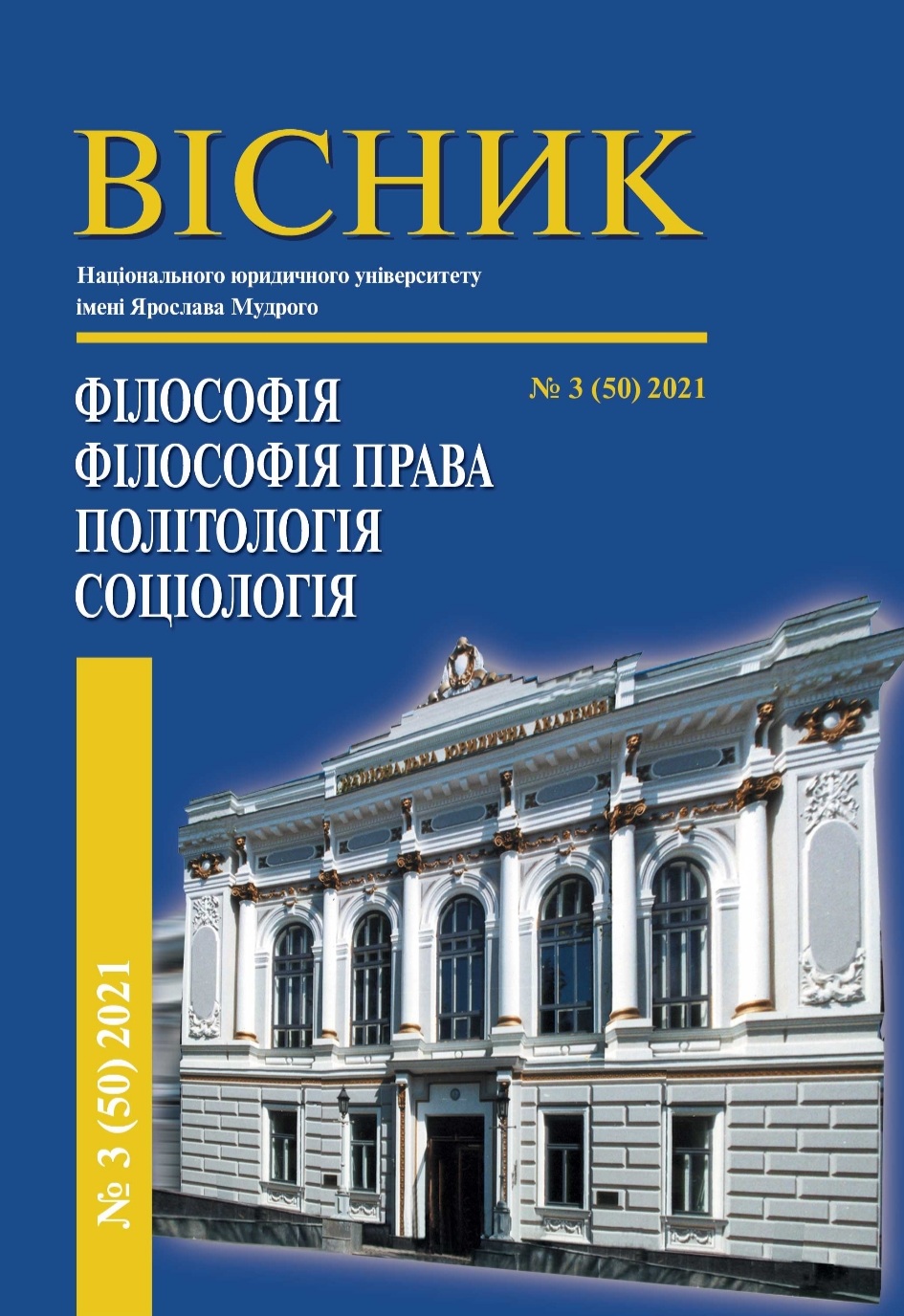ЖЕРТВА ЯК МЕДІАКОНСТРУКТ У ПРОСТОРІ БІОПОЛІТИКИ
DOI:
https://doi.org/10.21564/2663-5704.59.289698Ключові слова:
цифровий паноптикум, мережева комунікація, дискурс травми, жертва, колективна ідентичністьАнотація
У статті осмислений феномен конструювання жертви засобами трансмедійної комунікації. Перша частина присвячена ролі медіатехнологій у сучасному біополітичному просторі. Наголошено, що контроль над комунікацією в рамках нових владних парадигм здійснює нетократична еліта – нова форма кібертехнологічного суперпаноптизму. Показане значення медіалогіки у новій системі соціальних зв’язків та світоглядних моделей. У другій частині на основі дослідження феноменів глибинної медіатизації осмислена специфіка культурної трави та жертви як медійних конструктів, продуктів інформаційних технологій, покликаних відтворювати біополітичні імперативи.
Посилання
Martinez, D.E. (2011). Beyond disciplinary enclosures: Management control in the society of control. Critical Perspectives on Accounting, Vol. 22 (2), 200–211. https://doi.org/10.1016/j.cpa.2010.06.016.
Deleuze, G. (1992). Postscript on the Societies of Control. October, 59, 3–7.
Castells, M. (2013). Communication Power. Oxford University Press. https://doi.org/10.4000/books.editionsmsh.10551].
Sützl, W. (2016). Gianni Vattimo's Media Philosophy and Its Relevance to Digital Media? Philosophy Today. Vol. 60, 3, 743–759.
Krämer, S. (2016). Medium, Messenger, Transmission: An Approach to Media Philosophy Amsterdam: Amsterdam University Press. https://library.oapen.org/bitstream/id/761778d5-8853-4ca8-8813-b34a6b0ed3a8/628133.pdf.
Espinoza, Ch. (2012). Millennial integration: Challenges millennials face in the workplace and what they can do about them. Antioch University.
Digital anthropology. H. Horst, D. Muller (Eds.) (2012). London-New York: Berg, 2012.
Schulz, W. (2004). Reconstructing mediatization as an analytical concept. European Journal of Communication. Vol. 19, 1, 87–101.
Dean, J. (2010). Blog Theory. Feedback and Capture in the Circuits of Drive. Cambridge: Polity, 2010.
Chaffee, S.H., Metzger, M.J. (2001). The end of mass communication? Mass communication & Society. Vol. 4, 4, 365–379.
Dean, J. (2010). The Real Internet. International Journal of Žižek Studies. Vol 4, 1, 13–14.
Danilyan, О., Dzoban, О., Hetman, Y., Kalynovskyi, Y. (2023). Features of information war in the media space in the conditions of russian aggression against Ukraine. Cogito. Vol. 15, 3, 55–71.
Campbell, G., Smith, L., Wetherell, M. (2017). Nostalgia and Heritage: Potentials, Mobilisations and Effects. International Journal of Heritage Studies. Vol. 23, 7, 609–611.
Eckel, J., Ruchatz, J., Wirth S. (2018). The Selfie as Image (And) Practice: Approaching Digital Self-Photography. Exploring the Selfie: Historical, Theoretical and Analytical Approaches to Digital Self-Photography. London, New York, Shanghai: Palgrave Macmillan, 1–23.
Bareither, C. (2021). Difficult heritage and digital media: «selfie culture» and emotional practices at the Memorial to the Murdered Jews of Europe. International journal of heritage studies. Vol. 27, 1, 57–72.
Sather-Wagstaff, J. (2017). Making Polysense of the World: Affect, Memory, Heritage. Heritage, Affect and Emotion: Politics, Practices and Infrastructures. London, New York: Routledge, 12–29.
Thiemeyer, T. (2018). Erinnerungspraxis Und Erinnerungskultur. Erinnerungspraxis Zwischen Gestern Und Morgen: Wie Wir Uns Heute an NS-Zeit Und Shoah Erinnern. Tübingen: Tübinger Vereinigung für Volkskunde, 7–20.
Pinchevski, A., Richardson, M. (2023). Trauma and digital media: Introduction to crosscurrents special section. Media, Culture & Society, Vol. 45, 1, 178–180.
Kaplan, E.A. (2005) Trauma Culture: The Politics of Terror and Loss in Media and Literature. New Brunswick, NJ: Rutgers University Press.
Hirsch, M. (2012) The Generation of Postmemory: Writing and Visual Culture After the Holocaust. New York: Columbia University Press.
Meek, A. (2010) Trauma and Media: Theories, Histories, and Images. New York: Routledge.
Pinchevski, A. (2019) Transmitted Wounds: Media and the Mediation of Trauma. New York, NY: Oxford University Press.
Richardson, M. (2018) Radical absence: Encountering traumatic affect in digitally mediated disappearance. Cultural Studies. Vol. 32, 63–80.
Rattray, G.J. An Environmental Approach to Understanding Cyberpower. Cyberpower and National Security. Virginia: Potomac Books, 2009, 253-274.
Getman, A.P., Danilyan, O.G., Dzeban, A.P., Kalynovskyi, Yu.Yu. (2022). Modern ontology: reflection on the continuity of cyberspace and virtual reality. Revista de Filosofía. Vol. 39,102, 78-94.
Foucault, M. The Birth of Biopolitics: Lectures at the Collège de France, 1978-1979. New York: Palgrave MacMillan, 2008.
Bard, A., Jan Söderqvist (2012). The Futurica Trilogy. Stockholm: Stockholm Text.
Vattimo, G. (1992). The Transparent Society. Cambridge: Polity Press. https://doubleoperative.files.wordpress.com/2009/12/vattimo-gianni_the-transparent-society.pdf.
Žižek, S. (1997). Cyberspace or the unbearable closure of being. The Plague of Fantasies. London: Verso. https://issuu.com/clog_unlp/docs/cyberspaceunbearableclosureofbeing.
Lopez-Rabadan, P. (2022). Framing Studies Evolution in the Social Media Era. Digital Advancement and Reorientation of the Research Agenda. Social Science. Vol. 11, 1, 9 https://www.mdpi.com/2076-0760/11/1/9.
Cottle, S. (2006). Mediatized rituals: Beyond manufacturing consent. Media, Culture & Society. Vol. 28, 3, 411–432. https://doi.org/10.1177/0163443706062910.
Baudrillard, J. (1981). For A Critique of the Political Economy of the Sign. New York: Telos Press.
Rheingold, H. (2003). Smart Mobs: The Next Social Revolution. New York: Basic Books.
Žižek, S. (2002). Welcome to the desert of the real! Five essays on september 11 and related dates. London: Verso, 2002. URL: http://www.rebels-library.org/files/zizek_welcome.pdf (дата звернення:
Bottici, C. (2007). A Philosophy of Political Myth. New York: Cambridge University Press, 2007.
Jordan, T. (1999). Cyberpower. New York: Routledge.
Schussler, A.-E. (2017). The Cyberspace Myth And Political Communication, Within The Limits Of Netocracy. Journal for the Study of Religions and Ideologies. Vol. 16, 48, 65– 78.
Žižek, S. (2003). The Ideology of the Empire and its Traps. Empire's New Clothes: Reading Hardt and Negri. New York: Routledge, 255–267.
Danilyan, O., Dzоban, O., Kalynovskyi, Y. (2023). Digital man as a product of the information society. Cogito. Vol.15, 1, 142–158.
Wolf, В. (2003). Fritz Heider and Egon Brunswik. Their lens models. Origins, similarities, discrepancies. Nineteenth Annual International Meeting of the Brunswik Society: 100th Anniversary of Brunswik’s Birth. Vancouver.
Baudrillard, J. (1999). La Photographie ou l’Ecriture de la Lumiere: Litteralite de l’Image. L’Echange Impossible. Paris: Galilee.
McCloskey, S. (2022). The War in Ukraine Has Revealed a Hierarchy of Victims. Policy & Practice: A Development Education Review. 34. https://www.developmenteducationreview.com/issue/issue-34/war-ukraine-has-revealed-hierarchy-victims.
Alexander, J.C. (2005). The Meanings of Social Life: A Cultural Sociology. Oxford: Oxford University Press.
Agamben, G. (1998). Homo Sacer. Sovereign power and bare life. Stanfort: Stanford University Press.
Baudrillard, J. (2006). War Porn. Journal of visual culture. Vol. 5, 1, 86–88.



